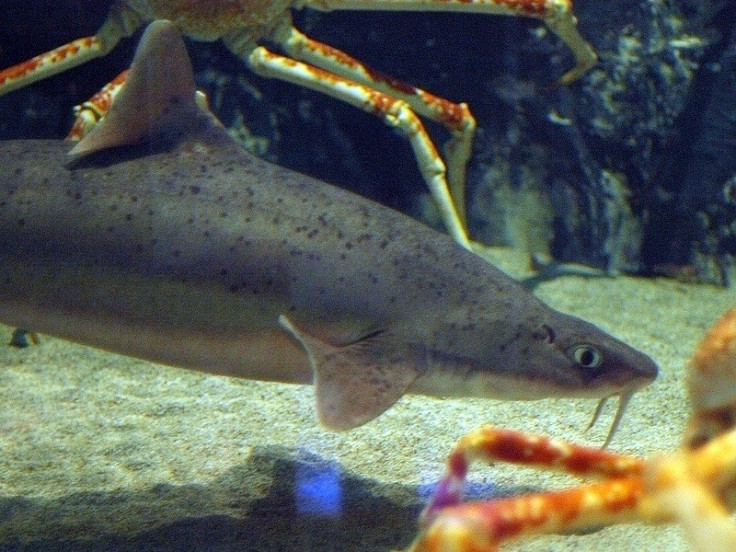Meet the ghost sharks and deep-sea demons that will haunt your dreams

Christopher Bird, University of Southampton
Sharks can be scary. But while most of us fear sharks such as the great white (not me, I'm fascinated by them), few are aware of what is lurking in even deeper waters. There, at depths of up to 3,000m, live the real monsters of the sea: elusive demon cat sharks, deep-sea dogfish and ghost sharks.
With weird teeth and evil eyes, they look like characters from a Tim Burton film. But perhaps the eeriest thing is the fact that we don't know much about them.
A good year for bizarre sharks
To help shed light on these creatures of the dark, I took part in a research expedition this September on board the Marine Research Vessel Scotia, en-route to a deep area of water off the west coast of Scotland called Rockall Trough. The goal was to collect samples for a project to help uncover the movement and feeding behaviours of deep-sea sharks.
Setting sun from starboard side
Christopher Bird
It was a busy two weeks of fishing between 500m and 2,000m and it would prove to be a challenging trip. Initial battles with seasickness, however, were quickly replaced with intrigue and excitement. Some of my colleagues had been working in the field for a long time, and consistently a creature would emerge that would ignite discussion. Luckily for me, it was an especially good year for bizarre sharks: four to five hauls a day, each with their own distinguishing oddities.

Eerie demon shark.
Christopher Bird, Author provided
Most of you will probably never have seen any deep-water sharks. Until about two years ago, neither had I. But even though they are obscured by thousands of metres of what might seem impenetrable dark, these are a group of hugely diverse and successful sharks. It is clear to see how many of these bizarre fish attained their ghoulish names.
The inaccessibility of the ocean depths has limited our scientific understanding of these creatures, a mystery that only strengthens their abstruse biology. I hope my research will pick away at that.
Collection of smalleye catsharks (Apristurs microps)
Christopher Bird
The deep-sea sharks can loosely be split into three groups; the dogfish (Squaliformes) the demon catsharks (Carcharhiniformes) and the ghost sharks (Chimeariformes). While the catsharks and dogfish are true sharks, ghost sharks belong to a group called the chimaera, cartilaginous fishes closely related to sharks.

Demon face.
Christopher Bird, Author provided
Of the catsharks, the most abundant family found in these Scottish waters were the demon/ghost catsharks, Apristurus. These creatures have slender bodies topped with flattened demonic heads and slit eyes that give resonance to their name. They are particularly difficult to identify and even during this trip we came across a species that we couldn't find in any books. We barely have a grasp on how many species there may be in this group, let alone their biology and ecology. We think they eat mainly shrimp in this area but apart from that, we are still very much in the dark.
Dogfish tend to be stockier sharks, with sandpaper-like skin, large eyes and jaws lined with rows of specialised teeth. Ranging from the small, 30cm-long, glow-in-the-dark lantern sharks (Etmopteridae), to the 1.5m leafscale gulper sharks (Centrophoridae), we found truly amazing diversity in these waters. These sharks appear to feed on a wide range of food items, from scavenged whale carcasses to small mid-water fish and shrimp.

Portuguese dogfish (Centroscymnus coelolepis)
Christopher Bird
Just to add to the creepiness, there were even gruesome parasitic barnacles that can gorge on the sharks' flesh.

Barnacles in the eye of the deep-sea black dogfish.
Christopher Bird, Author provided
I had only seen images of ghost sharks before the trip and their unearthly appearance consistently baffled me. Huge patchwork heads encase rodent-like teeth, and with their odd, slime-ridden bodies, Salvador Dali would have struggled to conjure up this fish. Ranging from the longnose spookfish (Hariotta raleighana) to the massive pale ghost shark (Hydrolagus pallidus), these chimeara are largely bottom feeding, sucking small animals up from the sea floor.

Chimaera opalescens
Christopher Bird
The real horror: an ecosystem in peril
These alien-looking creatures actually make up a large proportion of the fish that we find in the deepest waters. In fact, about half of all the sharks we currently know live there . In addition to the ghost and demon sharks, we also found a 2.5m sofa shark (Pseudotriakis microdon).
False catshark (Pseudotriakis microdon)
Christopher Bird
While appearances may horrify some, it is human activities that are creating a real-life horror story for these sharks. Deepening fisheries, mineral extraction and pollution all now pose a threat to deep-sea ecosystems. With exceptionally slow growth rates, high longevity and low reproductive rates, many deep-sea fish populations are struggling to compete with increasing intrusions.
Without knowledge of their basic biology or movement and feeding behaviours, it is difficult to assess how they will be affected by these continued disturbances. They may not be the most charismatic of animals but they fulfil a valuable role, storing atmospheric carbon dioxide and providing food for fisheries.
Longnose velvet dogfish neonate (Centroselachus crepidater)
Christopher Bird
Unfortunately, without appropriate management measures, these ghosts and demons of the deep soon could become no more than myths and legends.
Christopher Bird, Ph.D student: Deep-sea shark ecology, University of Southampton
This article was originally published on The Conversation. Read the original article.
© Copyright IBTimes 2024. All rights reserved.





